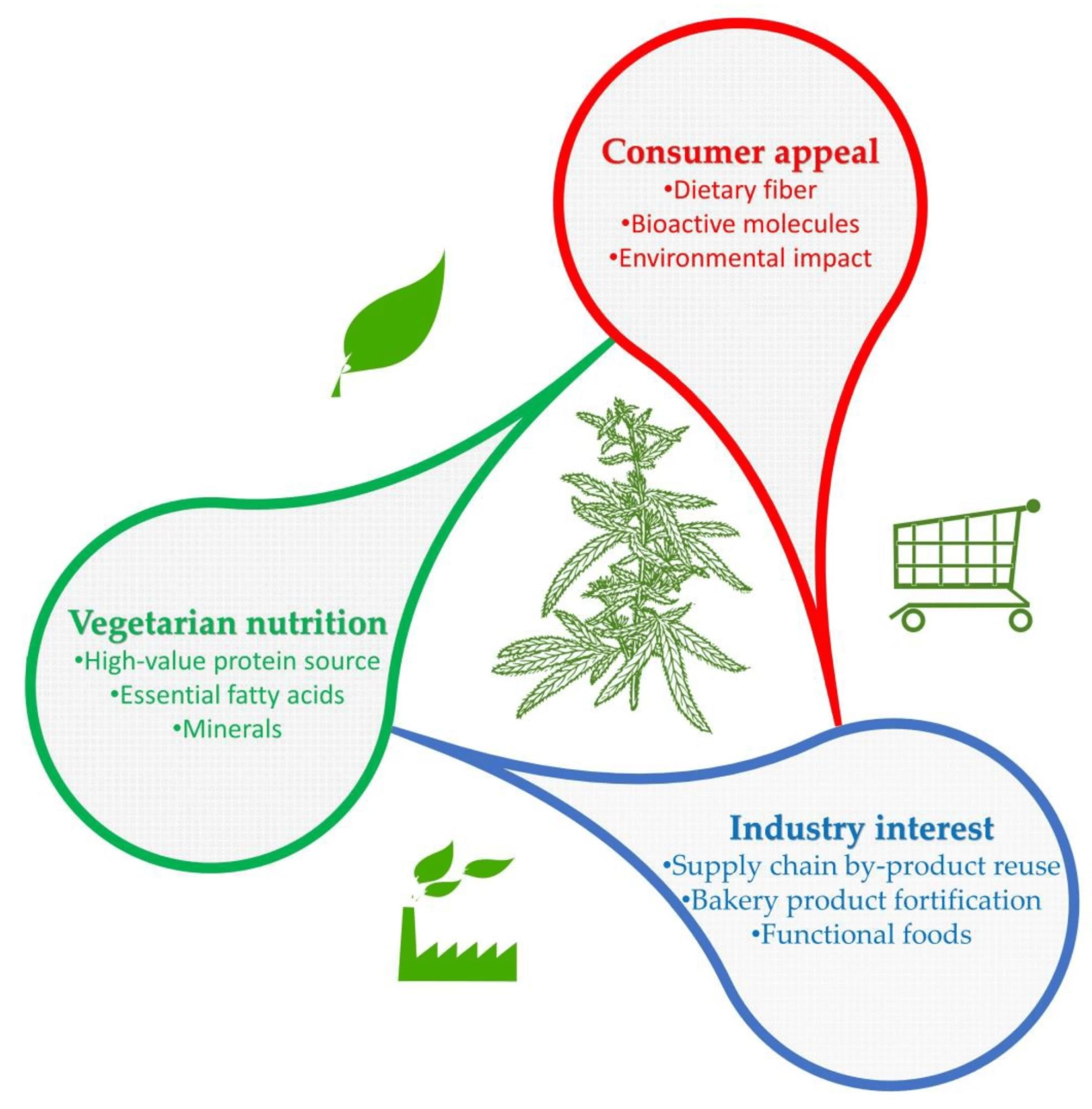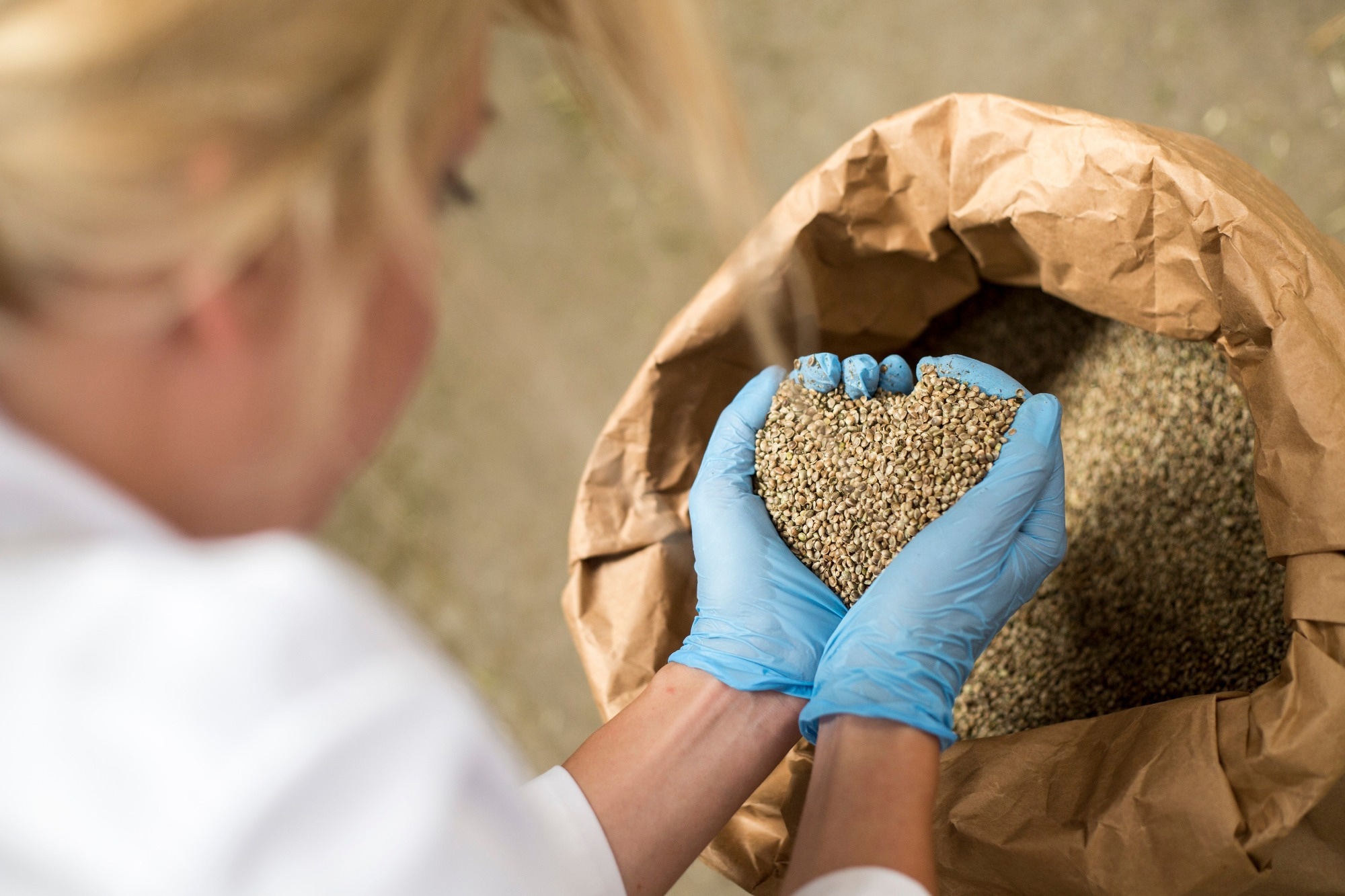In a recent study published in the journal Nutrients, researchers explored the published literature about hemp seeds to understand their nutritional properties, focusing on their role in vegetarian diets as a source of proteins, essential fatty acids, dietary fiber, and minerals. As hemp contains antioxidants and phytochemicals, it may prove to be a promising supplement for functional food manufacturers.
Study: The Role of Hemp (Cannabis sativa L.) as a Functional Food in Vegetarian Nutrition. Image Credit: MexChriss / Shutterstock
Background
Many countries, including the United States of America (USA), have banned Cannabis sativa (C. sativa) cultivation since the early 1930s to limit their psychotropic substance abuse. However, it also led to limited cultivation of C. sativa species with low THC used in textile industries.
Recently, many countries, including the USA, Australia, Canada, and China, lifted these bans and now allow the cultivation of low-THC cultivar (<0.3% w/w) based on the distinction between its use(s) for recreational (marijuana), industrial, medicinal, and nutritional (hemp) purposes, which had renewed interest in C. sativa and its uses.
Notably, in the last decade, the consumption of hemp seeds for nutritional purposes has almost doubled in Germany and the Netherlands.
 Graphical representation of promising hemp use.
Graphical representation of promising hemp use.
Health benefits of C. sativa
In the past, hemp seeds were considered a waste; however, nowadays, around 50 hemp cultivars with varying macronutrient compositions are grown worldwide for their high nutritional value.
The hemp seed protein content at max goes up to 30%, and their dietary fiber and lipid content ranges between 30-40% and 25–30%, respectively. In addition, its polysaccharide component is exclusively composed of dietary fiber. Another noteworthy aspect of hemp seeds is that they are versatile, allowing their consumption as a whole, hulled, oil, flour, or isolated proteins. It has also facilitated the development of several hemp-derived foods, edible oils, snacks, and flour at the commercial level.
A vegetarian diet should comprise several vegetable protein sources to meet everyday protein requirements, especially the essential amino acids. Hemp and its derivatives could supplement proteins with a high biological value, e.g., arginine. Arginine constitutes 12% of hemp protein, a substantially higher fraction than plant- or animal sources, such as soy, whey, egg white, and wheat. Furthermore, hemp has more sulfur-based amino acids. Most importantly, hemp has edestin, with branched-chain amino acids, cysteine, methionine, and aromatic amino acids, in which a vegetarian diet is low.
C. sativa polypeptides are also a rich source of bioactive peptides with antioxidant activity. Some hemp-derived polypeptides inhibited renin and acetylcholinesterase (AChE), similar to some Alzheimer’s disease (AD) drugs.
Hemp has a high content of unsaturated and polyunsaturated fatty acids (PUFA), which reach ~90% and 80% of their total lipid fraction. Moreover, hemp seed oil has a high (20%) oleic acid content (OA) similar to extra virgin olive oil, widely used in the Mediterranean diet, and has well-recognized health benefits. In addition, hemp seed oil had linoleic acid (LA) and alpha-linolenic acid (ALA). The World Health Organization (WHO) recommends ALA daily intake of 1–2% with omega-3 PUFA for vegetarians.
A planned vegetarian diet is usually sufficient in dietary fiber. Thus, hulled or whole seeds should be used based on an individual’s nutritional needs. In a vegetarian diet, hulled seeds could help improve digestibility while supplementing requisite quantities of dietary fiber.
In a vegetarian diet, some micronutrients, such as iron, zinc, and calcium, could be critical if unplanned. Calcium concentration in hemp seeds varies with cultivars, with some having 90 mg/100 g (low) and others having 955 mg/100 g (high) calcium concentrations. For vegetarians, consuming different sources of calcium through several dietary sources is a must to ensure adequate intake.
Besides being a plant-based nutritional source, hemp is a highly sustainable crop with a lower environmental impact and the ability to sequester carbon. Given its rapid exfoliation, it does not overexploit the soil. Furthermore, it requires fewer pesticides and has reduced irrigation needs.
Conclusions
The authors presented evidence that hemp seeds could be a valuable source of flour in the bakery industry, extraction of oils rich in essential fatty acids, proteins of high biological value, and an overall great nutritional supplement, especially for vegetarians.
In the future, with the emergence of novel techniques, hemp seeds’ potential health benefits might improve more. As a source of bioactive peptides, hemp might help treat metabolic pathologies, hypertension, and cardiovascular diseases. Thus, more research is needed to optimize the concentration of their bioactive compounds for more health benefits and verify the safety of concentrated hemp extracts.
Credit: Source link




